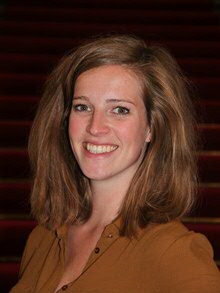In the Spotlight: "Perception of L2 prosody in cochlear implant simulations"

Speech perception can – very simplistically – be described as everything that happens between the perception of an acoustic wave and the interpretation of the speech signal. When the acoustic quality of the signal is degraded, speech perception is affected. This is the case for cochlear implant (CI) users; the signal digitized by the CI (i.e. an auditory prosthesis which uses electrodes to stimulate auditory nerve cells) is highly degraded compared to the signal that normal hearing (NH) individuals perceive. Consequently, perception of certain elements in the speech signal is compromised.
A component of the speech signal that is of great importance for the interpretation of that speech signal is prosody, as prosody (i.e. structured patterns of pitch and rhythm) forms an important source for information on the syntactic and semantic properties of speech. Not being able to adequately perceive specific prosodic elements – due to for instance a degraded auditory signal – could thus lead to errors in the comprehension and consequently the interpretation of the speech signal.
When perceiving prosodic elements of a language other than the mother tongue, such as a second language (L2), speech perception is even more complex. That is, L2 perception may be affected by a cross-linguistic influence of language-specific prosodic patterns, where patterns of the first language (L1) could interfere with the perception of those patterns in the L2, especially when the prosodic systems of the L1 and the L2 are very similar (but not identical). Hence, when listeners are, in addition to a degraded auditory signal, also affected by a cross-linguistic influence of language-specific prosodic patterns, speech perception – particularly speech comprehension – is likely to be strongly compromised.
To date, there have not been – to our knowledge – any studies on the perception of L2 prosody in a degraded auditory setting. In this PhD project, we will therefore bridge the gap in the current literature by investigating the perception of L2 prosody in (late) L2 leaners who are subjected to a degraded auditory signal, by using vocoder simulations of CI hearing. We will look at the influence of the quality of the auditory signal and of a (potential) cross-linguistic influence of language-specific prosodic patterns on the perception of L2 prosody for an L2 (English) that has a prosodic system that is similar (but not identical) to that of the L1 (Dutch).
| Last modified: | 08 February 2019 1.25 p.m. |
